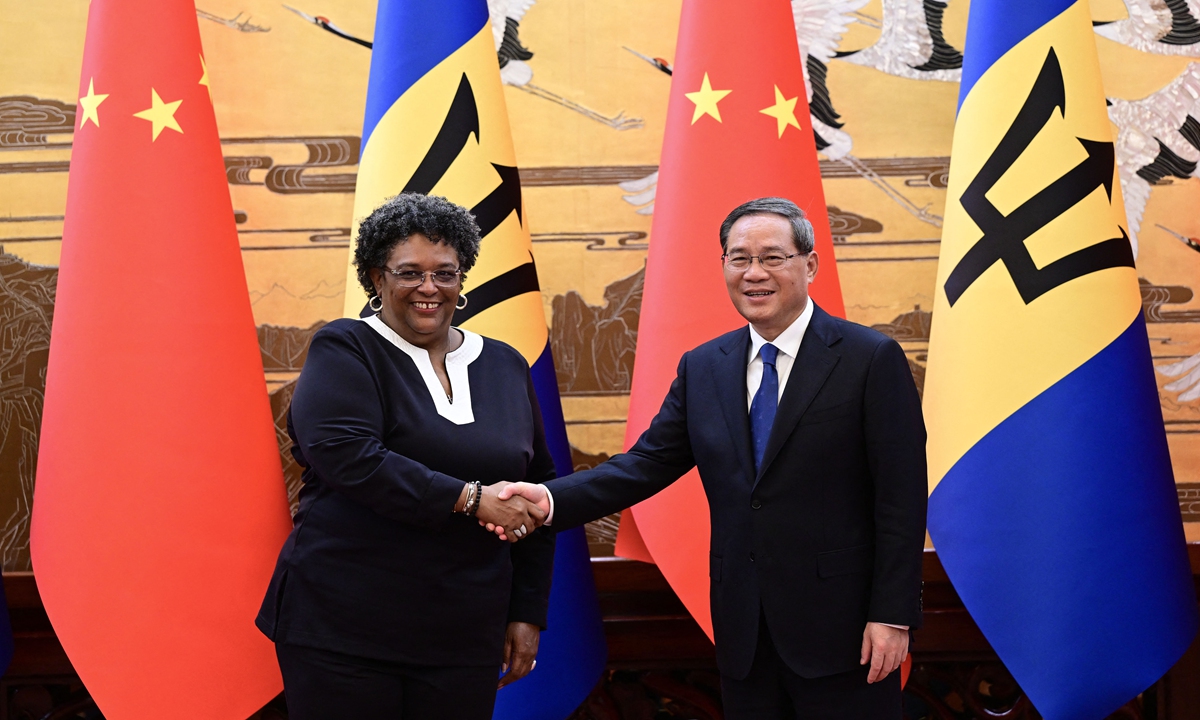In high summer temperatures, China has entered another diplomatic busy season, welcoming Barbados’ Prime Minister Mia Amor Mottley, Prime Minister Luvsannamsrai Oyun-Erdene of Mongolia, New Zealand Prime Minister Chris Hipkins and Vietnamese Prime Minister Pham Minh Chinh.
At the invitation of Chinese Premier Li Qiang, the leaders will attend the 14th Annual Meeting of the New Champions in Tianjin, also known as the Summer Davos Forum, and pay an official visit to China.
Hosting partners of the Caribbean and the Oceania, and two neighbors of Asia, China stands ready to deepen relations and enhance cooperation with countries across the world and hopes to inject momentum to post-pandemic global recovery and collective development through its opening-up and modernization, observers said.
Common development
Premier Li held talks with Prime Minister Mottley on Sunday in Beijing. Barbados is a good friend and partner of China in the Caribbean region, Li noted. He said that under the new circumstances, China is willing to enhance strategic mutual trust with Barbados, deepen cooperation in various fields, and build China-Barbados relations into a model of solidarity, cooperation and mutual benefit for developing countries.
China is ready to work with Barbados to promote the joint construction of a high-quality Belt and Road, and enhance exchanges and cooperation related to the economy, trade, culture and other fields. China encourages its enterprises to invest and do business in Barbados, stands ready to import more competitive products from Barbados, and will continue to provide assistance within its capacity for Barbados’ economic and social development, he said.
China understands the situation and special concerns of developing island countries in coping with climate change and other issues. China is willing to jointly seek solutions for financing difficulties, and to support developing countries as they accelerate their energy transformation and achieve sustainable development, he noted.
Chinese Ambassador to Barbados Yan Xiusheng told the Xinhua News Agency in a report on Saturday that China has provided various forms of support to Barbados, including grants, concessional loans and human resources training, which have continuously benefited the people of Barbados.
China has also aided in construction and renovation of a landmark local sports venue, the building of a center for food security and entrepreneurship project, and has dispatched medical care teams to the Caribbean country.
Chinese Foreign Ministry spokesperson Mao Ning said at an earlier routine press briefing that Mottley’s visit provides a good opportunity for China and Barbados to further enhance political mutual trust, expand cooperation, bring bilateral relations toward greater heights and brighter prospects.
Oyun-Erdene of Mongolia will visit China from June 26 to July 1. According to Mao, China attaches high importance to the upcoming visit by Oyun-Erdene and looks forward to further deepening political mutual trust, enriching bilateral comprehensive strategic partnership, and continuing to build a China-Mongolia community with a shared future through the visit.
Hipkins’ visit is his first China visit since taking office in January 2023. Although the prime minister’s priority is trade, the two sides are expected to discuss a wide range of topics.
Pham’s visit will be the first China visit by a Vietnamese prime minister in seven years. China and Vietnam, as socialist neighbors, will discuss ways and steps to act on the top party leaders’ common understandings and in particular, exchange views on deepening Belt and Road cooperation, enhancing connectivity and stabilizing industrial and supply chains, according to Mao.
One important agenda of the four prime ministers’ China visits is to attend the Summer Davos Forum scheduled on June 27-29. This year’s forum is themed “Entrepreneurship: The Driving Force of the Global Economy.”
According to official website of the Summer Davos Forum, about 1,500 participants from business, government, civil society, international organizations and academia will convene in Tianjin, and the event will renew momentum for innovation and entrepreneurship to drive economic growth and a more equitable, sustainable and resilient global development.
Li Haidong, a professor at the China Foreign Affairs University, told the Global Times on Sunday that China’s openness, its vast market and rich resources, mean opportunities for common development.
Wang Yiwei, director of the Institute of International Affairs at the Renmin University of China, said three of the four visiting prime ministers are from developing countries, which reflects that emerging economies are gradually taking the lead and acting as a driving force in globalization, replacing the developed West.
Chinese modernization on the direction charted by the 20th National Congress of the Communist Party of China (CPC), China’s fulfilling of development promises will be showcased and China is willing to provide a platform for open discussions so as to better answer the question of where globalization is heading against the backdrop of decoupling push by certain Western countries, Wang told the Global Times on Sunday.
Having gradually grown to be a leader in globalization over the past decades, China is providing opportunities and sharing growth and prosperity with the world, Wang said.
Gao Jian, an official from National Development and Reform Commission, told an earlier press conference that the forum “will help participants gain a deeper understanding of China’s economic performance, high-standard opening up and strengthen confidence in long-term investment in China.”
Diplomatic moment
China has received many foreign dignitaries and business representatives in the past few months since the foreign exchanges have been gradually normalized after the country relaxed the epidemic prevention and control measures, and successfully held vital events such as the Boao Forum for Asia and the first China-Central Asia Summit.
The Summer Davos Forum was seen by observers as another diplomatic prime time of China, which maintains normal exchanges with the rest of the world and keeps diplomatic consistency in resilience to the mounting noises of de-globalization and seeding of bloc confrontation.
Premier Li will deliver an opening address to the forum on Tuesday and conduct exchanges with visiting guests, three days after returning from his trip in Europe.
Barbados, Mongolia, New Zealand and Vietnam are located on different continents, and have different political systems, history, cultures, stage of development and economic sizes. China has varying interaction patterns with different countries, yet the foreign policy concept is consistent – all countries, big or small, strong or weak, rich or poor, are equal members of the international community, Li Haidong said.
The belief is written in the China-proposed Global Security Initiative. Analysts cited the example of New Zealand, with which China has vast differences in many aspects. But both countries seek to maximize common ground while reserving differences, which helps build a stable and fruitful relationship that benefits peoples of both countries.
At a time of heightened geopolitical tension and economic risks, China has been committed to the goal of safeguarding world peace and promoting common development and keeps the pursuit of a new type of international relations featuring mutual respect, fairness, justice and win-win cooperation, Li Haidong said.
The whirlwind of visits by foreign leaders and dignitaries is just one more evidence that China’s proposals on global governance is winning wider support while more and more countries are willing to ride the trend of the time with China to realize common development and prosperity, analysts said.













